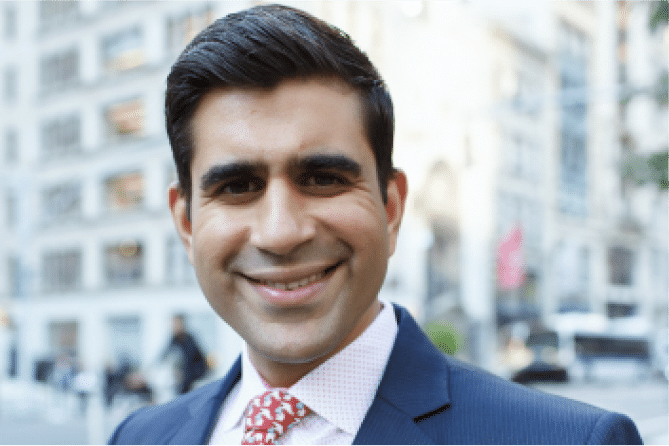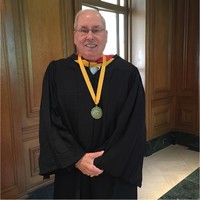Blue Ocean Global Technology Offers the
Following Expert Witness Services:
01
Testifying Expert Witness
02
Non-testifying Expert Witness
03
Expert Advisor
04
Expert Consultant
Why Choose Us
We have the expertise to provide optimal results tailored to suit individuals and businesses alike.
Achievements
Sameer Somal the CEO of Blue Ocean Global Technology

- Sameer Somal, the CEO of Blue Ocean Global Technology and co-founder of Girl Power Talk is a frequent speaker at conferences on digital transformation, diversity & inclusion, online reputation management, and relationship capital
- Somal is a published writer and internet defamation subject matter expert witness
- He is an active member of the Society of International Business Fellows (SIBF)
- He is a recipient of the CFA Institute 2022 Inspirational Leader Award
- He assists clients and helps them transform their digital presence
- He is a member of the Legal Marketing Association (LMA) Education Advisory Council
- He serves on the board of the CFA Institute Seminar for Global Investors and Future Business Leaders of America (FBLA)
- Somal leads collaboration with exclusive groups of PR, law, and management consulting agency partners
- He authors Continuing Legal Education (CLE) programs, in collaboration with the Philadelphia Bar Foundation
Expert Witness Services at Blue Ocean Global Technology
In 2015, we received multiple inquiries from law firms in search of expert witnesses for their cases. We promptly set our team in motion, and as a result, these firms now attribute our well-documented client expertise as a key factor in their decision to engage our services.
Subsequently, numerous other law firms have also sought our expertise as expert witnesses, seeking assistance with online defamation cases for both themselves and their clients.
Contact Us Today to Find the Right Professional for Your Case
We have helped numerous clients get a fair and successful outcome in court. Discuss your case with us today.
Awards
Expert Witness Services
In legal disputes, sometimes the subject matter of a case can fall outside the realm of legal knowledge. In such cases, professionals with specialized knowledge provide expert witness services to assist the court in understanding the complexity of a given topic.
Who is an Expert Witness?
An expert witness is an objective party tasked with explaining the technical, scientific, or theoretical complexities of the subject matter in a legal case. The expert witness is unbiased and is tasked with explaining the facts, without attempting to influence the outcome of the case in favor of either party.
An expert witness is an individual who possesses specialized knowledge, skills, experience, or education in a particular field that goes beyond what is typically understood by the average person. These individuals are called upon to provide their expert opinions and insights in legal proceedings, such as court trials or hearings.
What is the role of an expert witness?
The main roles of an expert witness include
- Educating the court
- Assisting attorneys
- Sharing technical perspective
- Analyzing evidence
- Providing reports
- Refuting opposing expert testimony on facts
Blue Ocean Global Technology: A Trusted Expert Witness Firm - (Expert Witness Expertise)
The process of becoming a certified expert witness is exacting. The court considers a wide variety of qualifications including work experience, business outcomes, publications, patents, honors, and awards. An individual’s membership in professional associations that go beyond whether the individual has the relevant degrees and specialization(s) is also considered.
Over the past decade, Blue Ocean Global Technology has handled clients’ digital reputation challenges, providing SEO expert witness services. In 2016, our CEO, Sameer Somal, was approached and subsequently hired by an Am Law 100 firm to be an expert witness. The law firm cited Blue Ocean Global Technology’s well-documented client expertise as the reason they engaged the team.
Types of Expert Witnesses
There are expert witnesses in many domains unrelated to judicial knowledge. Some of these include:
Intellectual Property Expert Witness
Intellectual property (IP) experts are professionals with specialized knowledge and expertise in intellectual property law. Their major roles in IP-related disputes include:
- Providing in-depth insights about IP laws
- Analyzing IP rights
- Assessing and calculating damages
- Preparing expert reports
- Providing expert testimony
Digital Forensics and Cybersecurity Expert Witness
Professionals who provide expert witness services in these areas have expertise in cyber attacks, data breaches, digital evidence, and forensics. They play the following roles:
- Evidence preservation
- Preparing detailed reports
- Data recovery
- Providing testimony in court
- Analyzing networks including traffic logs, firewall logs, etc.
- Analyzing, presenting, and preserving digital evidence from computer resources
SEO (Search Engine Optimization) Expert Witness
SEO expert witnesses conduct a comprehensive analysis with respect to search engine optimization to form an objective opinion for a case. They have both the technical proficiency and the ability to present their knowledge in a legal environment. SEO expert witness services include:
- On-page and off-page SEO audit
- SEO penalty assessment
- Identifying and fixing negative SEO practices
- Expert testimony in court
- Backlinking assessment
- Thorough analysis of online defamation
Social Media Expert Witness
Social media experts play a major role in disputes involving cyberbullying, harassment, violation of privacy, etc. Their role includes:
- Tracking online activity
- Authenticating social media evidence
- Identifying and preserving social media content
- Educating court and jury
Online Defamation Expert Witness
Defamation expert witness services come in handy when false comments, reviews, or other digital content about a business or organization are published online. Such experts play the following roles:
- Educating laymen on defamation law
- Analyzing online behavior
- Identifying and evaluating defamatory content
- Preparing reports and giving expert testimony in court
Our Expert Witness Services
Blue Ocean Global Technology provides expert witness services in research, analysis, and consulting. We specialize in social media, cybersecurity, digital forensics, online defamation, and search engine optimization among other allied expert witness services.
Case Evaluation and Consultation
One of the most prominent roles of an expert witness is to scrutinize and evaluate the case. This is done by reviewing the relevant materials available, including witness statements, legal documents, and evidence. Expert witnesses assist attorneys in leveraging and presenting this information to bolster their courtroom arguments.
Expert Report Preparation
One of the most crucial elements of expert witness services is the preparation of an expert report. The report includes:
- Credentials of the expert
- Overview of the case
- Facts and background
- The expert’s findings
- Expert’s opinion
- Conclusion
Trial Preparation and Support
Expert witness services are very useful throughout a case. For trial preparation and support, the expert helps in the following ways:
- Preparing an expert report supporting the client’s case
- Helping attorneys formulate questions for trial
- Participating in mock trials to help assess the strength of the case
- Being available for real-time support during the trial
- Helping in preparation of rebuttal testimony
Testimony in Court
During the trial, the expert witness testifies in court on behalf of the party that has called upon his services. They are involved in the following:
- The opening statement by the party includes a brief introduction of the expert
- Direct examination is conducted by the party who retained them and includes questions about their experience, qualifications, and track record
- Cross-examination by the opposing party
- Rebuttal testimony to the new points raised by the opposing party
- Questions from the jury or the judge
- Closing statements
Our Commitment to Being the Right Choice for Your Case
Having successfully navigated the exacting process of becoming a certified expert witness, Blue Ocean Global Technology is an established source of expert witnesses for cases involving digital marketing, social media, online defamation, and SEO.
We have helped numerous clients, ensuring that their cases were fairly heard in court. If you are considering or facing litigation in one of these areas, we can help you and your legal team identify and elucidate pertinent facts and convey them effectively.
Our Commitment to Being the Right Choice for Your Case
Blue Ocean Global Technology is an established source of expert witnesses for cases involving digital marketing, social media, online defamation, and SEO.
Customize Your Budget
Customized Budgets
"*" indicates required fields
FAQs
Expert Witness Services
- Who qualifies as an expert witness?
Not all experts are created equally—and when it comes to expert witnesses, state and federal courts have specific rules about who can be considered an expert witness.
In a federal court, the Federal Rules of Evidence deem that a qualified expert witness is someone who “is qualified as an expert by knowledge, skill, experience, training, or education may testify in the form of an opinion or otherwise if: the expert’s scientific, technical, or other specialized knowledge will help the trier of fact to understand the evidence or to determine a fact in issue; the testimony is based on sufficient facts or data; the testimony is the product of reliable principles and methods; and the expert has reliably applied the principles and methods to the facts of the case.”
In layman’s terms, the difference between an expert witness and a non-expert witness comes down to opinion. Expert witnesses are generally asked to give their expert or professional opinion on a situation. In contrast, non-expert witnesses can only testify about facts—what they directly saw or heard—not about their thoughts or opinions.
- What does it mean to be an expert witness?
Often considered one of the most critical elements of civil and criminal cases, expert witnesses are an integral part of the court system. An expert witness is someone that the court has determined is qualified to provide information and explanation to the jury to understand the case better. And as you may imagine, it takes specialized skills, training, education, and experience to be considered an expert witness.
At the time of the trial, the expert witness must be qualified by the court, and qualification is not a one-time event; each time the expert witness will be offering his/her opinion on a case, they must be requalified anew, regardless of any expert witness history.
The expert witness must always remember that their highest obligation is to the court, regardless of which party is paying their fee.
- What does an expert witness provide before the court?
The expert witness is in the courtroom to provide their independent, expert opinion on the matter at hand. Their top priority is always to provide their truthful, impartial opinion—regardless of if their opinion benefits the party paying their fees. Additionally, the expert witness may be expected to provide a written report for the court attesting to their opinion and findings.
However, there are also a number of things that expert witnesses are NOT expected to do. Expert witnesses are not in court to advocate or argue for a particular side or a specific outcome for the case, nor are they there to give an opinion on anything outside of their narrow area of expertise. Additionally, expert witnesses are not there to advise what evidence or information should or should not be presented to the jury.
- How does one become an expert witness?
Under U.S. law, an expert witness is someone whose opinion on a specific matter before a court of law is considered “expert” by the court because of that individual’s education, scholarship, and/or overall experience. Any testimony or evidence given by the expert witness is called an “expert opinion,” is submitted to the case as evidence, and can be rebutted in court by witnesses, conflicting evidence, or other experts.
Different countries have different standards for who can qualify as an expert witness and what the person can testify about. In the United States, each state has its own laws or guidelines about expert witness testimony in its state and local courts.
Additionally, while some expert witnesses may testify as an “objective” witness for the court’s and the jury’s benefit, individual parties in a court case can hire or consult with their own experts to prepare reports for the court or to testify, to provide information or argument on a client’s behalf.
- How does one write an expert witness report?
An expert witness report, whether intended to be submitted directly to a court or used for the benefit of one party in a case, is a written summary of the expert’s examination of and opinion on the case at hand. It typically includes the expert’s qualifications and experience, often with a CV, if applicable, along with a list of cases for which the expert witness has previously testified.
The report lists all the documents and evidence the expert reviewed in preparing the report, along with an explanation of why the expert witness’s opinion is applicable to the case. The expert outlines the development, analysis, and justification of their opinion of the case. The report typically ends with the expert’s opinion on the matters of judgment and damages, if applicable.
Ultimately, the report is either used by legal counsel to form arguments for their client or submitted to the court as evidence.
- How much do expert witnesses get paid?
Compensation for expert witnesses varies widely, depending on the nature of their contribution to a case, the amount of time and effort involved, and various other factors. Expert witnesses are typically compensated on an hourly basis but are sometimes paid an overall fee instead if the work is performed on a “per project” basis. Expert witnesses might also be compensated for research time, costs, and other expenses involved in providing their opinion.
For example, an expert witness might be paid $400 per hour for research and testimony, in addition to having their travel and lodging expenses reimbursed. Or they might be paid a lump sum of $10,000 for all work involved in the development of their expert opinion on a specific case. Again, costs can vary widely and depend on individual circumstances.
- Who can be an expert witness?
Technically speaking, anyone can become an expert witness as long as their qualifications as such are accepted by a court. By recognizing someone as an expert witness, a judge essentially makes them an expert witness.
In practice, a person can be an expert witness only if they have significant knowledge and experience in a specific field, whether through scholarship and study, a lengthy professional career, or similar circumstances.
- How does one become a certified expert witness?
To become an expert witness, an individual must present their credentials as an expert witness to the court, and the presiding judge must recognize them as an expert witness. An expert witness must be re-qualified every time they are to be presented as such in a court of law.
- What restrictions are placed on expert witnesses?
Specific restrictions are placed on what an expert witness can and cannot testify to. Expert witnesses are permitted to give their opinions only on matters for which they are deemed qualified as having expertise. This distinction is very important in circumscribing what is often heavily weighted testimony.
Expert witnesses are a specific exception to the “hearsay rule.” Traditional witnesses can testify only to what they know and have experienced and are not permitted to speculate about hypotheticals or report third-party testimony. Expert witnesses, however, may discuss hypotheticals and other “hearsay” matters, as long as those matters are within the purview of their expertise. For example, an expert witness who is a surgeon can discuss hypotheticals within a medical malpractice case, including background and contextual information, as long as their testimony does not extend beyond that subject.
That said, expert witnesses must take an oath to testify truthfully and obey all court rules and procedures, such as respecting the “chain of custody” when handling and examining evidence.
- What skills are required by an expert witness?
In addition to qualifications to substantiate their opinions, expert witnesses need several different skills to be effective. Expert witnesses must be able to clearly and concisely present to a court issues that are often complex and difficult for a layperson to understand. Any expert witness who wishes to maintain their credibility must also be able to speak truth to power, providing their honest, good-faith opinion on the matters before them, even if the person or law firm that hired them would prefer a different conclusion.
Additionally, the ability to testify in court with confidence and to answer difficult or loaded questions from opposing counsel on cross-examination are valuable skills for any witness, but especially for an expert witness. The expert’s opinion often carries a great deal of weight in complicated legal proceedings, and that responsibility must be taken seriously.
- What qualifies a person to be an expert witness?
Typically, an expert witness is someone whose level of scholarship, knowledge, or professional experience in a specific or specialized field allows them to provide testimony—their “expert opinion”—before a court of law on the evidence or circumstances of a criminal or civil case. A court must recognize this person as a qualified “expert witness” before they can testify as such.
Less formally, an expert witness’s qualifications will usually include previous experience as an expert witness, the ability to communicate complex ideas clearly, and the capacity to justify their expert opinion in the circumstances and evidence of the case in combination with their own experience in their specialized field.
- Can I sue an expert witness?
Expert witnesses can be sued only under very specific circumstances. Traditionally, witnesses brought before a court are immune from liability, even if they make a mistake in their testimony. This is to prevent witnesses from being discouraged from testifying by the threat of a lawsuit from the opposing party. That said, expert witnesses who knowingly present false information under oath are subject to charges of perjury, just like any other witness testifying in court.
Additionally, recent court rulings have allowed suits to be brought against expert witnesses who are negligent or fraudulent in their professional duties. A lawsuit against an expert witness is typically undertaken only when that witness commits a provable act of malpractice or other fraud. Indeed, some law firms have sued their own expert witnesses for breach of contract after discovering that the witnesses were lying or presenting fraudulent evidence to the court. Expert witnesses cannot be sued simply for giving evidence or forming an expert opinion that the opposing party disagrees with. The expert opinion might be challenged in cross-examination, however, or be rebutted with evidence or additional expert witness testimony.
- Can a police officer be an expert witness?
Police officers can be called as expert witnesses to testify either strictly on matters of law enforcement or on other police-related matters where the court recognizes their expertise. They are not permitted to testify about legal matters or the minutiae of the law (that is the purview of lawyers). Although law enforcement officers can form conclusions based on evidence presented in a case in their “expert opinion,” they cannot make statements as to a defendant’s guilt or innocence, given a defendant’s right to a fair trial. Police officers acting as expert witnesses will often testify on police procedure, rules of arrest, or correct steps for gathering evidence.
Additionally, even police officers who are not recognized as expert witnesses by a court can testify to certain things because of their training and experience. Traffic police, for example, are often extensively trained to accurately recognize the speed of a moving vehicle, usually within a few miles per hour, without the use of equipment such as a radar gun, and courts will generally recognize that estimation as evidence, depending on the circumstances.
- What do you mean by expert witness?
When a dispute or charge comes before a court, that court has a duty to weigh the evidence presented so it can come to a fair decision. Yet justice can be served, only when the parties weighing the evidence have a sound understanding of it. Often, the subject matter of a case falls far outside the realm of common knowledge, and an expert is needed to assist the court in fully understanding the key information involved.
In most such circumstances, an expert is charged with providing unbiased analysis and opinion, from their perspective as a qualified specialist, that illuminate the facts of the case. Once an expert’s opinions and reports have been presented to the court, they are typically treated as evidence—and can therefore have considerable influence over the outcome of the case.
- What is an expert witness?
An expert witness is a person with specialized knowledge or expertise in a particular field who provides impartial testimony in legal proceedings. They help the court better understand complex technical or specialized issues relevant to the case.
- How fast does reputation repair work?
The timeline of a repair campaign depends on the type of issue that is to be mitigated and the amount of positive content expected to be created. SEO, SMM, link building, and other such services are foundational pillars of improving brand awareness and the existing brand reputation significantly influences this timeline.
- How can social media impact your online reputation?
The accessibility of social media and its widespread reach makes it a crucial factor in maintaining your online reputation. How you interact and engage with your social media community greatly impacts how consumers feel about your overall brand. Proactive social media management includes addressing comments, managing reviews, influencer marketing, customer interaction, and creating an overall positive reputation for your brand.
Still have questions?
We’re here to assist! Feel free to leave all your inquiries and we will schedule a complimentary consultation today to chat about your online presence requirements.
"*" indicates required fields

























